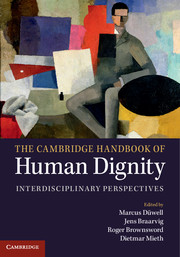Book contents
- Frontmatter
- Contents
- List of contributors
- Foreword
- Why a handbook on human dignity?
- Acknowledgments
- 1 Human dignity from a legal perspective
- 2 Human dignity: concepts, discussions, philosophical perspectives
- Part I Origins of the concept in European history
- 3 Meritocratic and civic dignity in Greco-Roman antiquity
- 4 Human dignity in the Middle Ages (twelfth to fourteenth century)
- 5 Human dignity in late-medieval spiritual and political conflicts
- 6 Human dignity in Renaissance humanism
- 7 The Council of Valladolid (1550–1551): a European disputation about the human dignity of indigenous peoples of the Americas
- 8 Martin Luther's conception of human dignity
- 9 Natural rights versus human dignity: two conflicting traditions
- 10 Rousseau and human dignity
- 11 Human dignity and socialism
- 12 Human dignity in the Jewish tradition
- Part II Beyond the scope of the European tradition
- Part III Systematic conceptualization
- Part IV Legal implementation
- Part V Conflicts and violence
- Part VI Contexts of justice
- Part VII Biology and bioethics
- Appendix 1 Further reading
- Appendix 2 Universal Declaration of Human Rights
- Index
- References
10 - Rousseau and human dignity
from Part I - Origins of the concept in European history
Published online by Cambridge University Press: 05 March 2015
- Frontmatter
- Contents
- List of contributors
- Foreword
- Why a handbook on human dignity?
- Acknowledgments
- 1 Human dignity from a legal perspective
- 2 Human dignity: concepts, discussions, philosophical perspectives
- Part I Origins of the concept in European history
- 3 Meritocratic and civic dignity in Greco-Roman antiquity
- 4 Human dignity in the Middle Ages (twelfth to fourteenth century)
- 5 Human dignity in late-medieval spiritual and political conflicts
- 6 Human dignity in Renaissance humanism
- 7 The Council of Valladolid (1550–1551): a European disputation about the human dignity of indigenous peoples of the Americas
- 8 Martin Luther's conception of human dignity
- 9 Natural rights versus human dignity: two conflicting traditions
- 10 Rousseau and human dignity
- 11 Human dignity and socialism
- 12 Human dignity in the Jewish tradition
- Part II Beyond the scope of the European tradition
- Part III Systematic conceptualization
- Part IV Legal implementation
- Part V Conflicts and violence
- Part VI Contexts of justice
- Part VII Biology and bioethics
- Appendix 1 Further reading
- Appendix 2 Universal Declaration of Human Rights
- Index
- References
Summary
Any discussion of Rousseau (1712–78) in connection with the notions of ‘human dignity’ and ‘human rights’ runs up against two problems. First of all, Rousseau rejects the idea that man would have an exalted place in nature – in fact, even primitive man is in a way disadvantaged as compared to other animals. The second problem is that Rousseau rejects the traditional notion of ‘natural right’ as an ideological ploy to protect the rich against the poor. These two problems are of course intimately connected, dignity, as conferred by reason and language, being since Grotius (1583–1645) the feature that serves as the basis of natural right. Nonetheless – and this is the real puzzle – the shadow of Rousseau hovers over any modern debate on human rights.
Man's natural condition
Many modern representatives of the natural right tradition make use of the idea of a state of nature, basically in two different ways. Either they postulate that in their ‘natural state’ men are driven by egoistic passions and engaged in a continual war of all against all, or they believe that by his very nature man is guided by the rule of reason and that he seeks a relation with his fellow men that corresponds to his specific dignity. In both cases, the creation of a civil society and a body politic would be a deliberate break with the past, which would be motivated either, as in Hobbes (1588–1679), by man's natural inclination to preserve his own being; or, as in Grotius and Locke (1632–1704), by the wish to protect and consolidate values of which man is naturally aware. Although therefore civil society is an artifact and in many respects constitutes a break with ‘nature’ it is in a way also ‘natural’, either because it embodies values inherent in human nature (the rule of reason), or because it is the prolongation, albeit with different means, of individual action; the enactment of a natural obligation or the best way to protect our own interests. In either case, we would sacrifice some of our ‘natural’ freedom but have something better in return, like safety, prosperity and culture.
- Type
- Chapter
- Information
- The Cambridge Handbook of Human DignityInterdisciplinary Perspectives, pp. 117 - 125Publisher: Cambridge University PressPrint publication year: 2014



